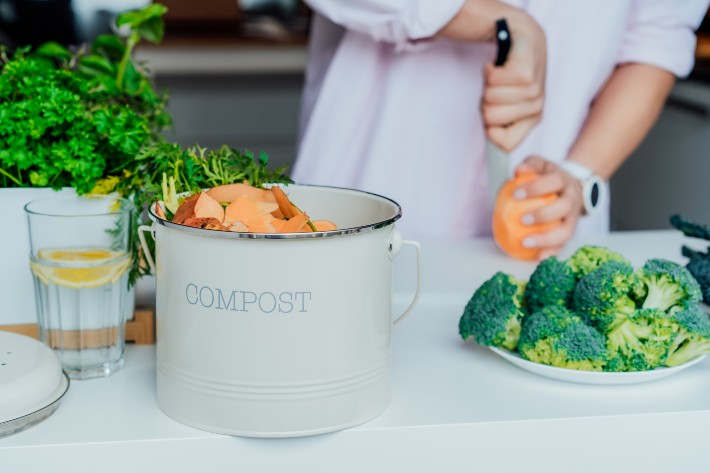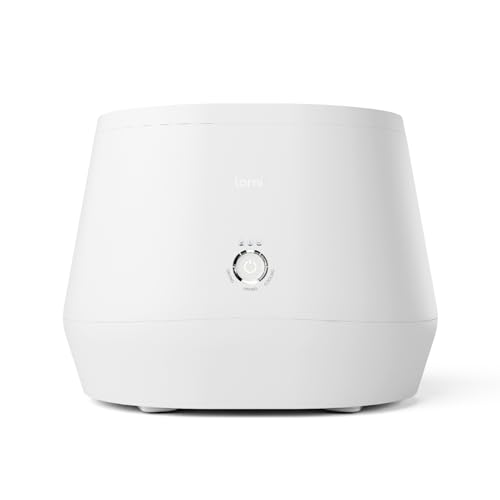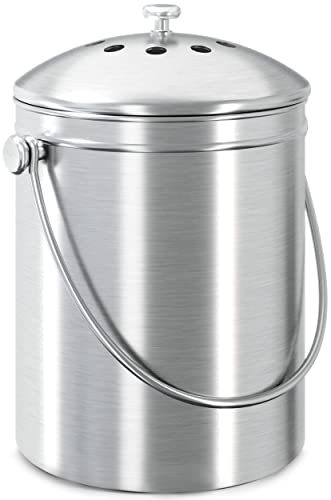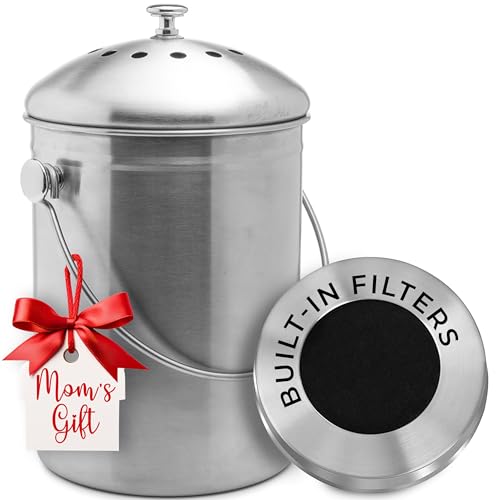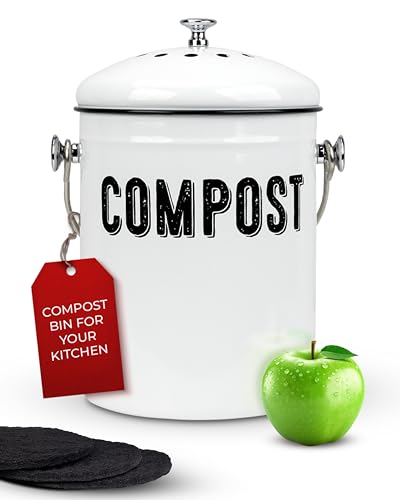- Recipes
- Breakfast Brunch
- Appetizers Snacks
- Lunch /Dinner
- Side Dishes
- Desserts
- Drinks
- Sauces & Stuff
- Collections
Learn & WatchOur content is meticulously curated through independent research, testing, reviews, and AI-driven recommendations, all designed to present you with the finest product choices. When you make a purchase through our links, it could result in us earning a commission.The Best Kitchen Composters of 2024
Last updated: 13 May 2024
When it comes to cooking and consuming food, there's a high chance for a pileup of leftover food scraps that we mindlessly toss in the garbage can. But did you know that food waste can be useful for the environment? Check out kitchen composters! These devices allow you to turn your kitchen waste into valuable compost, ideal for fertilizing your plants and reducing your carbon footprint. In this guide, we will share the best kitchen composters of 2024 that are easy to use and compact. The Lomi Kitchen Composter may be small, but it's big on simplicity and odor removal.
Our Top Picks For Kitchen Composters
- Best Overall: Lomi Kitchen Composter Shop Now ➔
- Best Charcoal Filters: Utopia Kitchen Composter Shop Now ➔
- Best Quality: EPICA Kitchen Composter Shop Now ➔
- Best Design: Granrosi Kitchen Composter Shop Now ➔
- Most Versatile: Joseph Joseph Kitchen Composter Shop Now ➔
View all ContentsThe Best Kitchen Composters
Best Overall
This Lomi Kitchen Composter is the perfect choice for anyone who wants to make composting easy and hassle-free. The bin has a single button that starts the composting process at room temperature, and the electric motor ensures the bin will never overheat or create any odors.
The bin’s compact size makes it easy to store on your countertop, and the single-button operation composts your food waste within four hours. This composter helps reduce your carbon footprint by 80% by composing soil compost that is high in nutrients. The combination of its compact dimensions, high functioning, and odor neutralization makes this product the top choice on our list.
Pros
- Lightweight and small size
- Simple to use
- Easy to remove the waste bucket
Cons
- Cleaning the waste bucket can be difficult
Best Charcoal Filters
The Utopia Kitchen Composter is an excellent solution for people looking for a simple and effective way to compost their kitchen scraps. It is made from good quality stainless steel, so it’s long-lasting and effortless to clean. It also comes with a lid that fits snugly, ensuring your compost stays fresh and free of odors.
This bin has a 1.3-gallon capacity, making it large enough to accommodate all of your kitchen scraps. Plus, it has unique charcoal filters that help absorb odors, keeping your kitchen smelling fresh and sanitary. This kitchen composter is also easy to clean; all you have to do is wash the compost bin with some soap and warm water. Its sleek and sturdy design will blend perfectly in your kitchen.
Pros
- Easy to clean
- Provides excellent value for the money
- Has a large capacity
- Prevents the build up of foul odor
Cons
- Looks very plain
Best Quality
This EPICA Kitchen Composter is a top-of-the-line product that is composed of long-lasting stainless steel. It comes with an airtight lid and charcoal filters to help get rid of smells. The filter is easy to replace, so you’ll never have to worry about your bin smelling bad.
This compost bin has a tight-fitting lid to keep pests out and prevent spills. To fit your countertops, this bin has a sleek and compact design. It is also rust and leak-resistant, as the whole structure is fused together. It’s big enough to hold 1.3 gallons of food scraps, so you won’t have to empty it every day.
Pros
- Amazing build quality
- Easy to clean
- The lid keeps the contents secure
Cons
- The charcoal filter isn’t as effective
Best Design
This Granrosi Kitchen Composter is the ideal solution to make use of your kitchen waste. It is constructed of alloy steel and has a large capacity. Additionally, it consists of high-grade filters that help remove any smells or odors. You will also receive two additional filters, in case you have to replace them, so you’ll be good for three to four months.
This metal compost bin is sturdy with a special coating on the interior that makes it resistant to rust, making this kitchen composter high quality. Its design is old school and timeless which is sure to add to the beauty of your kitchen decor. Plus, it has abundant space to hold your food scraps. Cleaning it is as easy as it could get, and all you’ve got to do is wash it with warm, soapy water and pat it dry with a gentle cloth.
Pros
- Handle makes it easy to empty compost
- Lid is easily removable
- Offers adequate size
Cons
- Doesn’t reduce odors efficiently
Most Versatile
The Joseph Joseph Kitchen Composter is created to make compiling food waste effortless. It features a convenient lid that flips up for an additional broad outlet and a sturdy handle composed of stainless steel. Its outlet makes removing food scraps easier. With a capacity of one gallon, this composter is ideal to compile a fair amount of waste.
It is made of polypropylene which is super handy to clean. This kitchen composter is created with a distinctive ventilated design that lets air rotate inside the caddy, removing the moistness to expel any smell from the decomposing waste. It also features a replaceable filter that works with fresh air to supersede the odor.
Pros
- Three colors to choose from
- Removes all odors
- Extremely easy to set up
- The ventilated design prevents any odor buildup
Cons
- A tad bit complicated to clean
Finding Your Next Kitchen Composter: A Buyer’s Guide
Now that you are familiar with the top kitchen composters in today’s market, let’s get started with what makes a kitchen composter worthy of being in the top choices. Here’s a short guide on everything you need to know about these handy devices.
How Does a Kitchen Composter Work?
A kitchen composter is a simple and effective way to reduce your food waste. They can also help reduce methane emissions from landfills, as well as reduce the amount of water needed to irrigate your plants. But, how do these composters work?
A kitchen composter typically has two chambers, so you can add food scraps to one chamber while the other chamber is “composting” or breaking down those food scraps into nutrient-rich compost. Some kitchen composters even have filters to reduce odor.
The process of decomposition is accelerated in a kitchen composter because of the warmth and moisture generated by the rotting food scraps. Aerobic bacteria thrive in these conditions and go to work breaking down the organic matter into simpler compounds that can be used as nutrients for plants.
As the chamber fills up with finished compost, you can empty it into your garden or yard, where it will provide valuable nutrients for your plants.
What Are the Different Types of Kitchen Composters?
Bokashi bin composters
Bokashi bin composters are perfect for small households or those who don’t have a lot of counter space. These types of kitchen composters come in a variety of sizes, but they all work using the same principle: layering food scraps with an aerobic fermentation process that breaks down the food without producing odors. Bokashi bins typically have a spigot at the bottom so you can drain off any excess liquids, which can then be used as plant fertilizer.
Compost crocks and pails
Compost crocks and pails are some of the most popular types of kitchen composters since they’re aesthetically designed and easy to use. Like bokashi bins, crocks, and pails use layering to break down food scraps. Rather than using anaerobic fermentation, these composters rely on microorganisms to break down the organic matter.
Features To Consider in a Kitchen Composter
Size
Most kitchen composters have a capacity of just a few gallons, but some larger models can hold up to four gallons. If you have a large family or you do a lot of cooking, consider choosing a larger model so you can compost all of your food waste. If you live independently or have a little family, a smaller model will suffice. You can find out the size of a kitchen composter in its product description. It will either be given in gallons or liters.
Design
Some composters are made to sit on your countertop, while others can be mounted under your sink. If you’re short on counter space, go with a composter that can be mounted under your sink. If you have an abundance of counter area, any type of composter will work. If you do decide to opt for an over-the-counter design, make sure the composter is built aesthetically and matches your kitchen’s interior.
Ease of use
You’ll also want to consider how easy the composter is to use. Some models come with filters that need to be changed regularly, while others have self-contained filters that never need to be changed. Choose a model that’s easy to use and low maintenance so you can stick with composting. You can get a good idea about a kitchen composter’s user-friendliness by going through some customer testimonials on the product page.
Price
Of course, price is also a significant consideration. Kitchen composters vary in cost from $30-$100 depending on the features and capacity. Choose the most reasonable option that meets your needs and budget.
Are Kitchen Composters Worth It?
Keeps food waste out of landfills
Every year, millions of tons of nutritional waste end up in trash yards where they decompose and radiate methane, a greenhouse gas that contributes to environmental change. By composting your food waste instead of tossing it out, you can help lessen methane emissions and do your part to slow down climate change.
Reduces your reliance on chemical fertilizers
If you keep a garden, then you might be aware of how crucial it is to use the right fertilizer so your plants will prosper strong and healthy. Unfortunately, many commercial fertilizers are full of harmful chemicals that can pollute the environment and even contaminate drinking water supplies. When you compost your kitchen scraps, you create a nutrient-rich soil amendment that you can use to fertilize your garden without worrying about harming the environment.
Cuts down on water usage
Did you know it takes a lot of water to produce the food we eat? In fact, according to the U.S. Geological Survey, it takes an average of 1,847 gallons of water to produce just one pound of beef. By composting your food leftovers instead of tossing them away, you can help diminish your water footprint and save this precious resource.
People Also Asked
What is a kitchen composter?
A kitchen composter is a device that allows you to compost your food waste right in your own home. Most kitchen composters are small enough to fit on your countertop, and they come with anodized aluminum bins and filters that help eliminate any odors from the kitchen scraps.
How does a kitchen composter work?
Kitchen composters work by breaking down food waste into nutrient-rich compost that can be used to fertilize plants or gardens. The process of decomposition is accelerated by the presence of oxygen and moisture, as well as bacteria and fungi that are naturally present in food waste.
What can I place in my kitchen composter?
You can put any type of food waste in your kitchen composter, including fruit and vegetable scraps, coffee grounds, eggshells, and even tea bags. But there are a few things that you should not put in your kitchen composter. This includes meat, bones, dairy products, and any oily foods.
How long does it take for food waste to decompose?
The time it takes for food waste to decompose varies depending on the type of food waste and the conditions in which it is being decomposed. In general, however, it takes about six weeks for food waste to break down into nutrient-rich compost.
Article Contributors
Read More About Cuisine Review Team HereThe Cuisine Review Team’s in-depth guides and product reviews are designed to help you pick the best products for a beautiful and professional-grade kitchen and dining room.
Cuisine at Home is reader-supported: When you buy through links on our site, we may earn an affiliate commission. Artificial Intelligence (large language models) may have been used in the research and creation of the content.
Please contact aimperiapt@gmail.com for all inquiries regarding articles or product testing.
